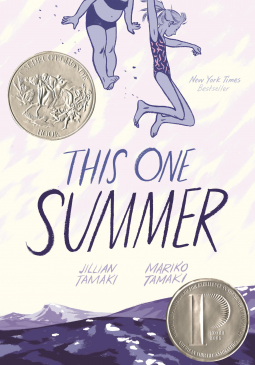TBT: My review of This One Summer, by Mariko and Jillian Tamaki
 This One Summer is a graphic novel by Mariko Tamaki with charcoal-and-ink art by Jillian Tamaki, a team of cousins whose first collaboration, Skim, won a New York Times Illustrated Children’s Book Award. Summer tells the complex and ultimately edifying story of Rose, a tween (her age is never stated) who deals with family tensions and—vicariously, by watching the local teens in the town where her family vacations—explores the mysterious world of near-adulthood.
This One Summer is a graphic novel by Mariko Tamaki with charcoal-and-ink art by Jillian Tamaki, a team of cousins whose first collaboration, Skim, won a New York Times Illustrated Children’s Book Award. Summer tells the complex and ultimately edifying story of Rose, a tween (her age is never stated) who deals with family tensions and—vicariously, by watching the local teens in the town where her family vacations—explores the mysterious world of near-adulthood.
Rose’s mom, Alice, is dealing with depression in the aftermath of a failed pregnancy, and this leads to conflict with Rose’s kindly (and slightly immature) dad. And as this conflict progresses from tension to acrimony to reconciliation, Rose finds her attention drawn—first as an observer, and then as a sort of spy—to a parallel drama playing out between a convenience-store clerk (and subject of a minor crush) and his apparently pregnant girlfriend. Her attention caught by these two stories, Rose seems to be pondering what role she can take on as an adult, and which one of the two roles that present themselves—familiar, beloved, but withdrawn mother, or emotional, liberated, but tragic teenage girl—lie closest to how she sees herself.
Also in the mix is Windy, Rose’s younger friend, who serves as a foil for Rose’s dilemma. Windy is full of slighting references to the teens’ drama, and whether this stems from sincere disdain or a desire to keep them at a safe distance, she gives voice to perspectives that are both younger and older than Rose’s. In this way, she serves as a representation of the ways in which the community around an adolescent can be both comforting and alienating.
At the same time, Jillian Tamaki’s beautiful, wall-art-worthy charcoal illustrations turn Windy into a fully realized character, full of exuberant expression and motion. The artwork does the same for all the other major characters as well, in particular Rose’s mother Alice, distressed and distant, haggard and routinely withdrawn at least partially from the frame.
The artwork also serves as the perfect backdrop for Rose’s uncertain exploration. Human landscapes—interiors of family cabins most prominently—are presented in loving detail but also in stark, ascetic terms. The landscape of the beach community, while clearly Canadian, seems so lush that it almost appears tropical—and yet in several instances this same landscape conveys a sense of menace that echoes the darker aspects of the conflicts swirling around its main characters.
Summer ends with these conflicts largely resolved. Rose’s search for a place to call her own in the adult world concludes with a rediscovery of the strengths of her family and community, which equates to a rediscovery of her own strengths. The reader is tempted to imagine that Rose will find that maturing will move her closer to her true self—to a role that suits her.
Given the language, Summer may not qualify as a YA title for some, except in the sense that it concerns young protagonists. But it has much to offer as a portrait of the confusions and consolations of life on the verge of young adulthood.
Price: $17.99.
Age range: late middle school to high school. Something adults might also enjoy.
Stuff to know: contains language some might find objectionable. Subjects referenced include miscarriage, suicide, sex, and teen pregnancy.
Review copy furnished via NetGalley.